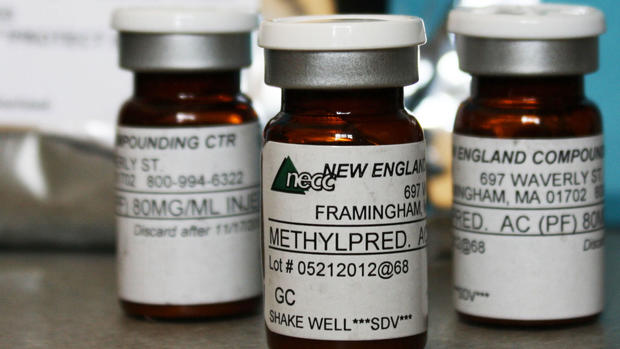297 infected in 16-state meningitis outbreak
A 16-state meningitis outbreak has sickened 297 people as of Monday Oct. 22, twelve more than the Centers for Disease Control and Prevention had reported the previous day.
The death toll remained at 23 on Monday after two new deaths were reported over the weekend, one in Tennessee and one in North Carolina.
Most of those infected have confirmed cases of fungal meningitis -- many from steroid injections used for back pain -- but the CDC notes three of the cases are linked to peripheral joint infections from shots given in joints such as the knees, ankles or shoulders. No deaths have been associated with peripheral joint infections, the CDC said.
The outbreak stems from lots of contaminated methylprednisolone acetate steroid injections made by the New England Compounding Center of Framingham, Mass. that up to 14,000 patients received for pain treatments in 23 states.
Last week, the Food and Drug Administration confirmed the fungus found in at least 40 people sickened with fungal meningitis -- called Exserohilum rostratum - was also found in more than 50 unopened vials from one of the recalled lots.
"Testing on the other two implicated lots of methylprednisolone acetate and other NECC injectable medications continue," according to the CDC.
- Ex-workers: Company linked to meningitis outbreak had questionable practices
- Tenn. doc: Meningitis outbreak may be waning
- Inside CDC's efforts to stop meningitis outbreak
Exserohilum is common in dirt and grasses, but it rarely causes illness and has never before been identified as a cause of meningitis, according to CDC officials.
Two other patients have been found with two different types of fungus -- Aspergillus fumigatus and one with Cladosporium - that are also common in the environment and rarely cause meningitis.
CDC officials have found that only one drug has been definitively linked to the outbreak, methylprednisolone acetate steroid injections, even though the New England Compounding Center (NECC) made hundreds of products.
Ninety-seven percent of the 14,000 patients who received injections from the implicated lots of steroids have been contacted for follow-up, according to the CDC.
The agency still urges vigilance to be on the lookout for new symptoms, because fungal meningitis infections can be slow to develop. In the current outbreak, symptoms typically appear between one and four weeks following the injection, but cases have been reported with shorter and longer time periods for onset of symptoms.
